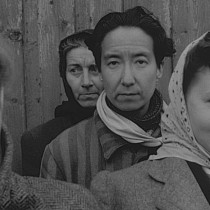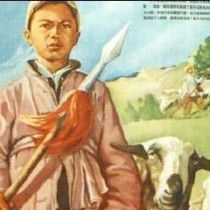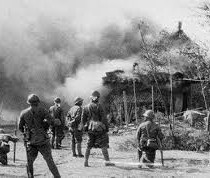A Chinese Woman in Ravensbrueck Concentration Camp
- By Peter Harmsen
- 9 October, 2013
- 32 Comments
When emaciated female prisoners from the German concentration camp Ravensbrueck arrived in the Swedish harbor of Malmoe on April 28, 1945, just days before the German surrender, two of the … Continue Reading →
Re-enacting the Sino-Japanese War
- By Peter Harmsen
- 7 October, 2013
- 34 Comments
History can be studied in many ways. One of the most direct ways to get a visceral feel for what happened to earlier generations is to join the growing ranks … Continue Reading →
Chinese or Japanese? Telling Friend From Foe
- By Peter Harmsen
- 3 October, 2013
- 13 Comments
In early 1945, it was obvious that the Japanese had lost the war, but it was still unclear how much longer they would hold out or where the final stages … Continue Reading →
Children of War
- By Peter Harmsen
- 25 September, 2013
- 13 Comments
Millions of people have recollections from the Second Sino-Japanese War, but most have never told their story – meaning valuable insights about one of history’s greatest conflicts risk being lost … Continue Reading →
Math with the Enemy
- By Peter Harmsen
- 18 September, 2013
- 93 Comments
The war in China is the most under-reported part of World War II. Valuable testimony is lost every day because people who lived through the bloody events pass away without … Continue Reading →
Battle of Khalkhin Gol (II)
- By Peter Harmsen
- 15 September, 2013
- No Comments
Japanese soldiers considered it a huge humiliation to be taken prisoner. As the photo on the left shows, it happened for many of them in the summer of 1939, when … Continue Reading →
Battle of Khalkhin Gol (I)
- By Peter Harmsen
- 13 September, 2013
- 22 Comments
The 1939 Battle of Khalkhin Gol on the border of China and Mongolia pitted Japanese soldiers, such as the tank crew on the left, against Soviet troops. It was a pivotal … Continue Reading →
‘All Quiet on the Western Front’
- By Peter Harmsen
- 11 September, 2013
- 18 Comments
Erich Maria Remarque’s 1929 antiwar novel All Quiet on the Western Front (Im Westen nichts Neues) became an international bestseller, selling nearly two million copies worldwide and translated into over 20 languages … Continue Reading →
Frontier Mavericks: Japan’s Kwantung Army
- By Peter Harmsen
- 7 September, 2013
- 24 Comments
Japan’s Kwantung Army, a unit operating in what is now northeast China, exemplified the emperor’s soldiers at their most death-defying, if not death-worshipping, as the photo on the left suggests. … Continue Reading →
Gung Ho!
- By Peter Harmsen
- 20 August, 2013
- 15 Comments
The expression gung ho – meaning “extremely or overly zealous or enthusiastic” – is as American as apple pie, but just as apple pie was originally a British dish going back to medieval times, this particular idiom … Continue Reading →











 Copyright © 2024
Copyright © 2024